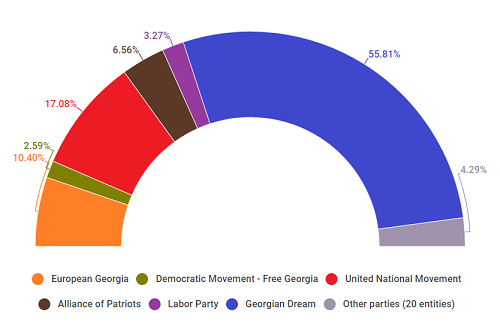| Elections 2017: Weekly Digest No. 7 |
| Civil Georgia, Tbilisi / 3 Nov.'17 / 12:41 |

Nationwide party list support in municipal elections. Photo: Civil.ge
On October 21, Georgian citizens cast their ballots to elect 2058 members of 64 city councils (Sakrebulo) and 64 municipal mayors.
Civil.ge actively covered the election campaign, offering its weekly digest, a news compilation on political party activities, election procedures and other pre-election developments, as well as related political happenings.
The seventh digest covers the final stage of the campaign, the Election Day and subsequent developments.
For earlier pre-election developments please refer to Weekly Digests No. 6, No. 5, No. 4, No. 3, No. 2 and No. 1.
Election Campaign and Pre-Election Environment:
- At the end of the election campaign, two television channels – the Georgian Public Broadcaster and Rustavi 2 - hosted debates between Tbilisi mayoral candidates. Political parties – the New Georgia, the Labor Party, the Development Movement, the European Georgia and the ruling Georgian Dream held their final campaign events as well;
- Two days before the municipal elections, Georgian leaders - Prime Minister Giorgi Kvirikashvili and President Giorgi Margvelashvili - urged the voters to participate in the elections;
- Three local election watchdogs – the International Society for Fair Elections and Democracy (ISFED), the Georgian Young Lawyers Association (GYLA) and the Transparency International Georgia – released a joint assessment of the pre-election environment. “The pre-election period was mostly peaceful and political parties were noticeably active,” the joint document reads, adding that “throughout the campaign period the ruling party’s dominance was evident;”
- The pre-election period was marred by an assault with a firearm against the ruling party’s majoritarian candidate and accompanying individuals on October 19, at night, near the Georgian Dream office in Kizilajlo village of Marneuli.” The investigation was launched under article 117 of the criminal code of Georgia.
Election Day and Results:
- 369 candidates were registered for mayoral polls with 13 candidates in Tbilisi, home to roughly one-third of the total voter population. 22 political parties, 5 election blocs and 201 initiative groups nominated candidates in the elections across the country. The number of registered majoritarian candidates was 4,727 and Sakrebulo candidates through party lists – 12,902;
- Out of 3,440,123 registered voters, according to the preliminary results, 1,569,992 voters (45.64%) cast their ballots on the Election Day. Following the polling process, Rustavi 2 TV and Imedi TV released the exit poll results, which put the Georgian Dream party and its candidates decisively ahead of their opponents throughout the country. Later in the evening, Prime Minister Giorgi Kvirikashvili congratulated supporters on the election victory and called the municipal elections “a very important victory of Georgian democracy;”
- On October 22, the Central Election Commission started releasing the preliminary election results, which does not significantly differ from final figures. According to the final vote tally, released on November 1, the ruling Georgian Dream’s mayoral candidate, Kakha Kaladze, won the mayoral elections with 51.09% of votes, followed by independent candidate, Aleko Elisashvili, who finished with 17.48% of votes. The opposition United National Movement’s mayoral candidate, Zaal Udumashvili, comes third with 16.59% of votes, followed by European Georgia’s Elene Khoshtaria with 7.11% of votes. The Georgian Dream dominated in the party-list contest as well and won all 25 majoritarian districts in Tbilisi, securing 40 seats in the 50-member Tbilisi Sakrebulo;
- According to the preliminary results, out of 64 municipalities, the ruling party candidates won elections in 57. The Georgian Dream candidates are also leading in those six election districts, where second round runoffs will be held on November 12. The United National Movement, which garnered 17.08% of votes countrywide under the proportional contest, managed to qualify for second round races only in two districts;
- Tamaz Mechiauri of “Tamaz Mechiauri - For United Georgia,” managed to obtain victory in the mayoral elections in Tianeti Municipality, making him the only non-GDDG candidate to win a mayoral race in the country.
Observer and Party Assessments:
- According to interim reports released immediately after the municipal elections, all main local and international election watchdogs agree that the elections were held in a calm environment in compliance with democratic principles;
- Among the violations, local election watchdogs focused on “the control over voters’ will.” In its assessment, NDI highlighted the lack of political competition, while the joint document released by OSCE/ODIHR and the Congress of Local and Regional Authorities of the Council of Europe (Congress) noted that “the predominant position of the ruling party is clear, and this affected different aspects of the elections.” The U.S. Embassy to Georgia released a brief statement as well, concurring with the OSCE’s preliminary report;
- Municipal elections were conducted “in a largely peaceful environment, but with many shortcomings, addressing which is of crucial significance for Georgian democracy,” President Giorgi Margvelashvili said in his remarks on the elections;
- The United National Movement announced on October 23 that it would not participate in runoffs, citing “mass rigging, blackmail and use of administrative resources” as the reason behind its decision;
- Thirteen non-parliamentary opposition parties expressed mistrust towards the election results. Their leaders announced that they would challenge the final vote tallies in court.
